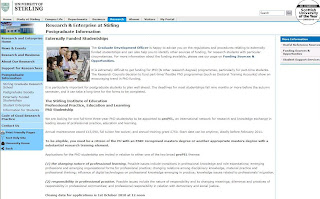Turf Wars: the battle to conserve earth-built structures duringrapid climate changes
Dr Paul Adderley (Supervisor)
Dr Craig Kennedy (Co-Supervisor - Historic Scotland)
Earth-built structures are major and valued components of the landscape across Scotland and Northern Europe; such structures include field-boundary walls in historic landscapes, domesticd wellings and farm byres. Climate changes are an obvious cause of disruption to such structures yet little beyond empirical observation is understood about their long-term fate under such conditions. This studentship aims to address this issue through developing a process-based understanding of the interaction between the materials used in the construction of these structures and individual climate factors. Three hypotheses will be tested:
(i) that microscale features of turf and clay-organic building materials sensitive to phenomena associated with climate change can be identified; and
(ii) that through comparative sampling across contexts that ratevariables associated with changes in these features can be obtained for past-climates; and
(iii) that the parameters for a predictive model of disturbance to earth-built structures--at scales useful to the development of conservation policy--can be established.
Research Activities: The first phase of the project will examine historical sources and develop field sampling and monitoring ofearth-built structures. The second phase of project will use the School of Biological and Environmental Science's new controlled-environment facility to simulate the effects of changedclimate factors (elevated temperature and oscillating moistureregimes) on these materials. The third and final phase of the project will be a comparison between these results in order toidentify rate variables associated with the decay of earth-built structure features relative to changes in exogenous climate variables.
Research Support and Environment: The University of Stirling is Scottish University of the Year for 2009/2010 (Sunday Times) and isconsistently ranked best in the UK for 'a good place to be'(International Student Barometer). Stirling offers a lively research community and postgraduate research students have access to the supportive environment offered by the Stirling Graduate Research School. Internationally recognised research expertise in Geoarchaeology and Environmental History including the Research Centre of Environmental History and Policy is supported by facilities including dedicated state-of-the-art soil and sedimentanalysis laboratories.
The project will have undoubted value in respect to policy and knowledge transfer to relevant stakeholders including Historic Scotland, Scottish Natural Heritage (SNH), National Trust for Scotland, and Royal Commission on the Ancient and Historical Monuments of Scotland. The advanced training and relevance of thetopic to such a range of stakeholders therefore offers strong prospects for further career advancement for the successful student.
Enquiries/Application: Applications are invited from candidates suitably qualified in architectural, environmental or heritage science backgrounds. An interest in archaeology or built-heritage isessential. Skills in soils or sediment analysis are desirable.
Informal enquiries to Dr Paul Adderley
Formal applications including: Letter of Application, CV, and details of two referees should be sent to
Dr Paul AdderleySchool of Biological and Environmental Sciences University of Stirling
Stirling FK9 4LA
Scotland, UK

